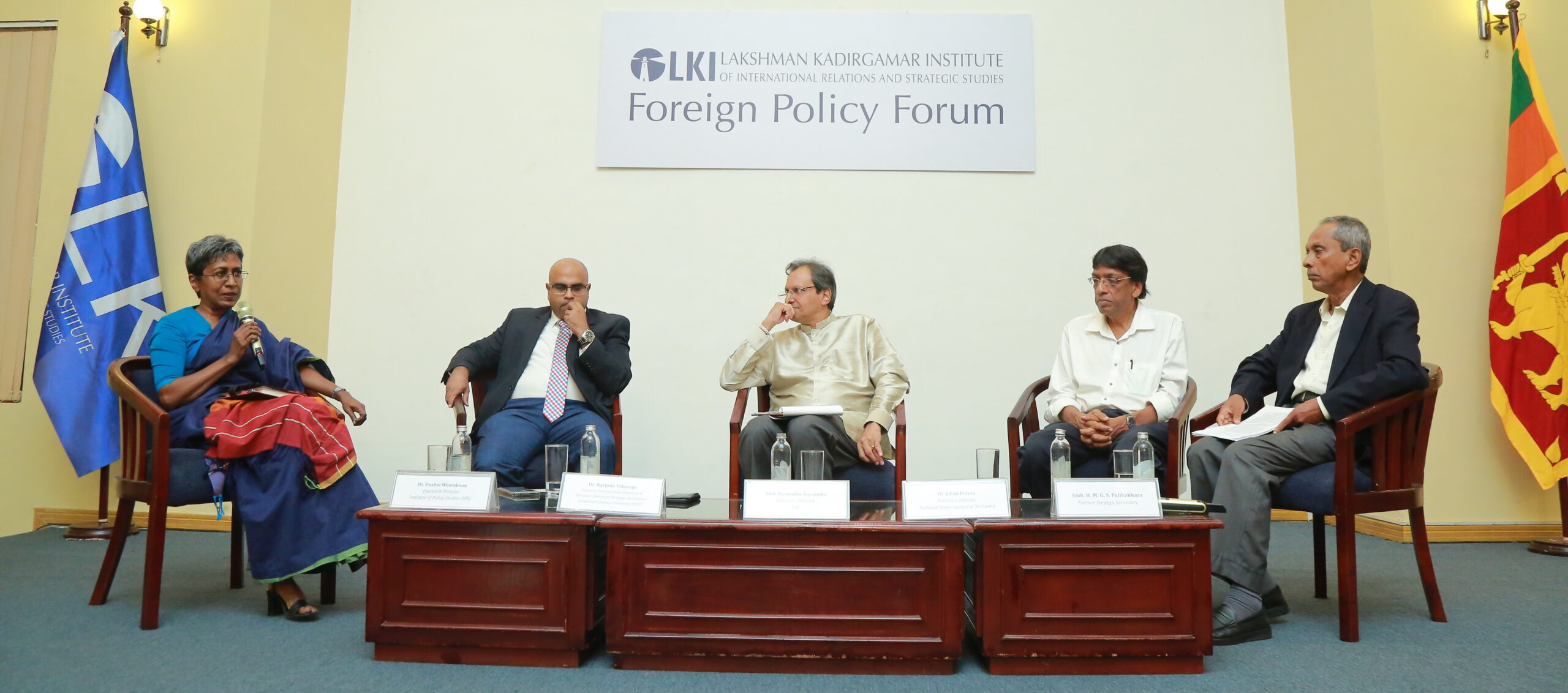August 11, 2023 Reading Time: 3 minutes

Reading Time: 3 min read
The inaugural LKI Foreign Policy Forum, titled “Changing Global Dynamics: Implications for Sri Lanka”, was held on Wednesday 9th August 2023, in the presence of Minister of Foreign Affairs Hon. M.U.M. Ali Sabry, State Minister of Foreign Affairs Hon. Tharaka Balasuriya, and a representative gathering comprising of heads of diplomatic missions and international organisations, government officials, academics, business leaders, civil society, media practitioners, as well as students. The discussion, moderated by LKI Executive Director Ambassador Ravinatha Aryasinha, included four eminent panellists with backgrounds in security, economics, foreign affairs, and civil society.
Opening the panel discussion, Ambassador Aryasinha identified seven key trends in the changing global dynamics: volatile global power politics; emerging pressures on the global economy; power rivalries in the Indian Ocean; the increased significance of India; the crisis in multilateralism; the inconsistency of state voting in the United Nations system; and the changing role of non-state actors in a rapidly expanding public sphere. These outlined the emerging challenges regarding political, strategic, economic, and external relationships for Sri Lanka and laid the basis for the discussion.
Dr Harinda Vidanage, Director/International Relations & Director/Centre for Strategic Assessment, Kotelawala Defence University (KDU), discussed the current nature of global affairs with reference to great power and multilateral alliances, the pursuit of small state strategic autonomy in the Indian Ocean, and the preparedness of the defence industrial base to address present-day threats in the Indo-Pacific region. Referring to the future of small state strategic autonomy, he mentioned a probable ‘shaking of the established powers’ by emerging middle-range powers such as India and France, and said Sri Lanka failed to benefit from foreign investments due to the binary oversimplification of complex situations. Dr. Vidanage emphasised that the way forward in the security sector requires strategic assessments of present-day and emerging threats that would effectively address the current challenges in the realm of security, including the spread of disinformation and the politicisation of these matters within Sri Lanka.
Dr Dushni Weerakoon, Executive Director, Institute of Policy Studies (IPS) recognised the growing importance of geopolitical and security strategies into economic policy, with trade and investment strategies no longer being built on purely economic principles. She described how trade policy has become a battleground and major economies are now focussing on building domestic capacity in crucial sectors such as renewable energy and semiconductors, to reduce dependence on bilateral partners. In the question-and-answer session, she also questioned the sustainability of Sri Lanka’s non-aligned foreign policy, as it weakens their position in trade negotiations.
Ambassador H. M. G. S. Palihakkara, Former Foreign Secretary, emphasised that the overarching challenge that is faced by Sri Lanka in its foreign relations, is demonstrating that it is after tangible economic benefits and not “geopolitical mischief” in the Indian Ocean. He discussed the need to harmonise domestic and foreign policies to effectively overcome the acute issues arising from the economic crisis, deal with the Indian Ocean geopolitical “trilemma” between India, China, and the United States, and address accountability and reconciliation at a system-wide level. Ambassador Palihakkara further suggested that Sri Lanka must re-establish its core principles for foreign policy to better navigate this ever-changing geopolitical climate, which includes a focus on avoiding involvement in great power rivalries, reciprocal engagement with all countries, and promoting a policy of international cooperation geared towards the Sustainable Development Goals (SDG).
Dr. Jehan Perera, Executive Director, National Peace Council of Sri Lanka (NPC), emphasised the vital role of civil society organisations in guiding the “moral compass” of Sri Lanka and securing the people’s interests, particularly on the issues of human rights and good governance. Dr. Perera described the success of such moves in the past and how civil society can shape, endorse, and overturn questionable and discriminatory policies in the name of the people. He said that the need for timely elections, addressing requirements of the European Union’s GSP+, the proposed Anti-Terrorism Act, and the political will that is necessary to promote power sharing, could be issues that will influence the attitude towards Sri Lanka by the international community.
The panel discussion was followed by a thought-provoking question-and-answer session, where panellists responded to questions and comments from the audience. Topics included the contemporary relevance of the UN charter, Sri Lanka’s relationship with India, the establishment and expansion of Free Trade Agreements, the evolving role of non-state actors in foreign policy decisions, and the importance of Sri Lanka’s strategic location in the Indian Ocean. This provided a platform for new perspectives on relevant issues regarding Sri Lanka’s foreign policy and promoted further discussion.
The complete release is available here
Sinhala translation is available here
Tamil translation is available here